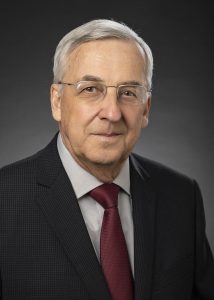
Marian Kazimierczuk, professor emeritus of electrical engineering, continues to advise doctoral students and teach, despite retiring last year.
A longtime professor of electrical engineering with a rich history of scholarly writing and empowering his students to succeed — electrifying them, so to speak — retired in December. Kind of.
Marian Kazimierczuk, Ph.D., who came to Wright State in 1985, is now a professor emeritus in the College of Engineering and Computer Science. But his work is not finished.
He’s advising a handful of doctoral students — one who is on a Fulbright Scholarship, another who is on a European Union stipend — to supervise them until they graduate.
None of the stereotypical retirement activities like golf or fishing for him.
“I like to be around people. I’m interested to be with students, to help them be successful,” Kazimierczuk said.
And successful they have been, putting to work what they learned from the man who early in his own academic career discerned the difference between “electrical” and “electronics” at the Technical University of Warsaw in his native Poland.
Electrical refers to equipment, sometimes heavy-duty, that carries electricity to be turned into other forms of energy. Electronics refers to controlling electrons to perform a task, such as conveying information in a computer.
“The electronics side of electrical engineering was very new and attractive to me,” he recalled.
Electronics is at the heart of a cellphone, for example. He said advances in electronics has made cellphones “small, easy to use, easy to carry, less weight. Very much mobile.” He added, “Electronics is relevant to everyday life.”
He chose to study electronics. “The choice was good for me,” Kazimierczuk said.
As it was for his students. Karl Sölvi Guðmundsson was Kazimierczuk’s first Ph.D. graduate and is now professor of electrical and computer engineering at the University of Iceland.
“The courses I took with him, he made them fascinating,” Guðmundsson said. “He always took the time to explain thoroughly. He was more than the usual teacher. He talked with love of what he was explaining. Being able to master his subjects helped me in the job market.”
Guðmundsson, who earned his Ph.D. at Wright State in 2004, added: “I do my best to teach like him. He has been a role model. He always had time to guide me. And that’s what I’m here to do for my students.”
Guðmundsson emphasized this: “Dr. Kazimierczuk was the only teacher I saw who was in the computer lab writing papers.”
Indeed, Kazimierczuk has been a prolific writer, with 228 scholarly articles and 274 conference papers. He also has written 14 academic books.
“I write books that are useful for students, researchers, those in the industry, and for R and D [research and development] work,” he said.
His most recent book is “Average Current-Mode Control of DC-DC Power Converters” with then-students Dalvir Saini and Agasthya Ayachit.
“This book is on my Ph.D. dissertation,” Saini said. “After my Ph.D. defense in 2018, he suggested that we should try publishing it.” She added, “Dr. Kazimierczuk was a great Ph.D. advisor for me and he advised me throughout the writing process for this book.”
Saini is an electronics engineer on the electrical and electronics material evaluation team, material and manufacturing directorate, at the Air Force Research Lab.
“’Legendary’ is how I can summarize Dr. Kaz,” Ayachit said. “If I can wish for one thing, I would ask for his dedication to science and perseverance and patience towards research. Off work, Dr. Kaz enjoyed simple things, like a walk at Yellow Springs, a pep talk on new ideas, a flashback on world history, and so on, and I’m glad to have shared those with him. I thank him for setting up my career launchpad and for all those wonderful experiences, which I will cherish for a long time.”
Ayachit earned his Ph.D. in 2018 and is a senior systems engineer at Mercedes-Benz Research and Development North America.
“I design and develop power electronic components for future EVs for Mercedes-Benz along with a global team of engineers,” the resident of Troy, Michigan, said.
These are only three of a long line of Kazimierczuk’s successful Wright State graduates.
“I’m very proud of all of them,” Kazimierczuk said. “They have become successful people. I am proud of the success they have had. It brings me happiness when they report something great.”
Kazimierczuk plans to return in the fall to teach as an emeritus professor of electrical engineering.
“My mission is to improve people’s lives, to change people’s lives,” he said. “Education can do that.”

 Wright State psychology team studies ways to identify fatigue in pilots, drivers
Wright State psychology team studies ways to identify fatigue in pilots, drivers  Wright State videographer Kris Sproles wins Regional Emmy and Ohio journalism award
Wright State videographer Kris Sproles wins Regional Emmy and Ohio journalism award  Wright State Boonshoft School of Medicine ranked among the nation’s best for 2024 by U.S. News
Wright State Boonshoft School of Medicine ranked among the nation’s best for 2024 by U.S. News  Exposing biotechnology
Exposing biotechnology  Wright State faculty member Dan Noel uses unique background to inspire new leaders
Wright State faculty member Dan Noel uses unique background to inspire new leaders 